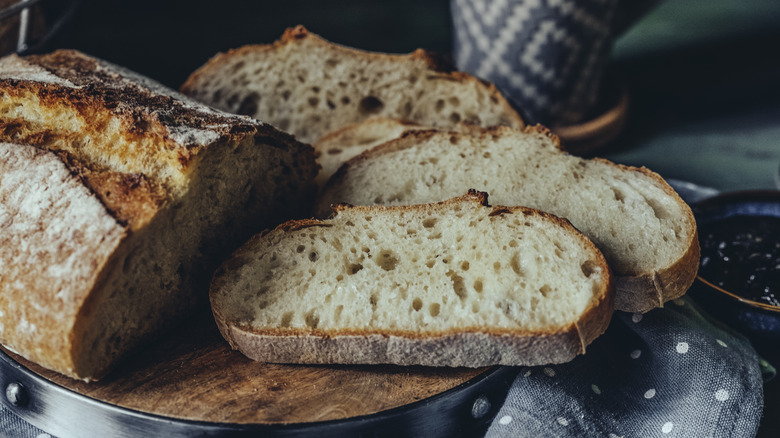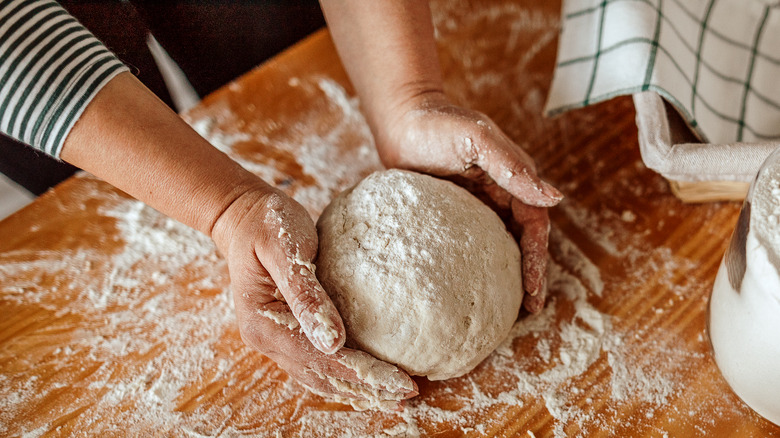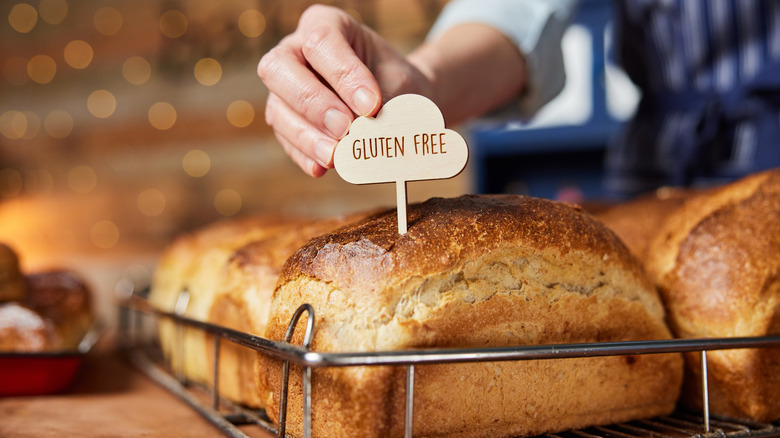Why Some Gluten-Free Foodies Still Eat Sourdough Bread
You'd think that somebody who eats a gluten-free diet would avoid any kind of bread (well, unless you're talking about bread made with a gluten-free flour like rice flour). However, some gluten-free eaters will eat sourdough bread, even though it's made with wheat flour — which is known for containing gluten. The reason is that making sourdough typically involves an hours-long fermentation process. During this fermentation, the bacteria from a sourdough starter will begin to break down gluten, as well as fructan, which is another carbohydrate that can also cause bowel issues similar to gluten intolerance.
Because the proteins (such as gluten) and carbohydrates in sourdough are more broken down than in regular, industrially-made white bread, it's generally considered more gentle on the digestive system — and therefore better for some people with gluten sensitivity, or with other conditions like irritable bowel syndrome. But this doesn't mean sourdough is gluten free: The fermentation process makes it a relatively low-gluten food, but it may still have upwards of 2,000 parts per million of gluten. For comparison, for a food or flour to be (legally) labeled as gluten-free, the Food and Drug Administration (FDA) requires that it have less than 20 parts per million, which it considers a level so low that it can't accurately be detected using accepted scientific methods.
But not all gluten-intolerant folks should reach for that sourdough
So, it's obviously still inaccurate to say that sourdough is safe for those on a gluten-free diet. Even though it's low on gluten, there's still enough for it to be harmful to those with a wheat allergy or Celiac disease. It's really only those with a more tame gluten intolerance who might be able to handle it. While some people with gluten intolerances will eat it, the official position of organizations that advise, represent or treat people with Celiac disease or gluten intolerance tends to be that it's best to avoid sourdough completely. Alternatively, it's possible to find sourdough made with non-wheat flours like sorghum.
A big issue is that it's hard to assess exactly how much gluten is in a loaf of sourdough — generally speaking, the longer the dough ferments, the less gluten there will be. But, for example, if you're shopping for sourdough, there's no guarantee that a bakery cashier will have information on the fermentation time. Plus, different sourdough starters might break down gluten at a different rate, making it harder to assess how much gluten is in one loaf. The idea of sourdough potentially being better for people with gluten intolerance or celiac disease also just hasn't been researched thoroughly enough: An Italian study from the journal Clinical Gastroenterology and Hepatology in which people with celiac disease ate sourdough without problems is often cited, but it only had a handful of participants. It's still an open question that needs more research.
The difference between gluten intolerance, allergy, and Celiac disease
In theory, if your body doesn't react well to gluten, it's probably best to simply avoid eating foods that contain it altogether. That said, not all gluten-free eaters experience the same physiological responses to gluten: There are levels of severity, which is why some gluten-free folks may indulge in sourdough from time to time.
The most severe is a wheat allergy: If you have this and you eat foods with wheat, it can cause an immediate and severe reaction, including anaphylactic shock (not unlike someone with a peanut allergy eating peanuts). If you're allergic, even trace amounts of wheat can be harmful. Then there's Celiac disease: This is an autoimmune disorder, and if you have this and eat gluten, your small intestine can be damaged over time, leading to malabsorption of nutrients. If this is you, it's also best to simply avoid gluten, although very small trace amounts can often be tolerated. Then there's gluten intolerance or sensitivity, which is more common and can cause immediate discomfort but not generally symptoms that require immediate medical care: Those with a mild intolerance are more likely to be able to eat something like sourdough. (Confusingly, some people incorrectly refer to Celiac disease or gluten intolerance as an allergy.) Of course, if you're unsure about your ability to safely eat gluten, it's best to consult a doctor.


